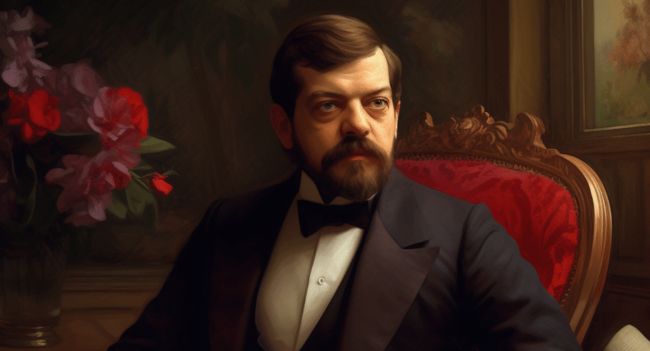Claude Debussy (1862-1918) was a French composer known for his groundbreaking work in the style of Impressionism. He was one of the most influential composers of the late 19th and early 20th centuries, and his innovative use of harmony, texture, and timbre had a profound impact on the development of classical music. Debussy’s works, including “Clair de Lune,” “La Mer,” and “Prelude to the Afternoon of a Faun,” are considered masterpieces of the Impressionist movement and continue to be widely performed and celebrated today.
Early Years
Claude Debussy was born on August 22, 1862, in Saint-Germain-en-Laye, France. He was the youngest of five children and grew up in a musical family. His father, Manuel-Achille Debussy, was a sales representative, and his mother, Victorine, was a seamstress. He was close to his siblings, especially his sister, and had a strong relationship with his parents throughout his life.

Music Genre
Famous Works
- “Clair de Lune” (Moonlight) – is a beautiful and evocative piano piece that is one of Debussy’s most famous works.
- “La Mer” (The Sea) – a three-movement orchestral work that captures the moods and sensations of the sea.
- “Prelude to the Afternoon of a Faun” – a musical depiction of a poem by Stéphane Mallarmé, this piece is one of Debussy’s earliest and most famous works.
- “Reverie” – is a dreamy piano piece that is one of Debussy’s most popular works.
- “Estampes” (Prints) – a collection of three piano pieces that are inspired by different cultures and landscapes.
- “Images” – a collection of three pieces for piano that are known for their impressionistic qualities and their innovative use of harmonies and tonalities.
- “Sonata for Violin and Piano” – a challenging and innovative work that showcases Debussy’s mastery of form and structure.
Life Challenges

- Financial difficulties: Despite his success as a composer, Debussy struggled financially throughout his life. He faced financial difficulties early on in his career, and he was often forced to live modestly. He also struggled to support himself and his family, and he was frequently in debt.
- Health problems: Debussy suffered from various health problems throughout his life, including digestive and respiratory issues. He was also diagnosed with colon cancer in 1909, and he passed away in 1918 at the age of 55.
- Rejection by the establishment: Despite his innovations and originality, Debussy was often rejected by the musical establishment of his day. He was considered to be an outsider, and his unconventional and impressionistic style was often met with resistance.
- Personal challenges: Debussy had several close relationships with women throughout his life, but he was never able to settle into a stable personal life. He was known to be a private and introspective person, and he struggled with depression and anxiety at times.
What can we learn from Debussy’s Music?
-
- Innovation: Debussy was a true pioneer in the world of classical music, and he constantly pushed the boundaries of what was possible with his innovative and unconventional style. He showed that it is possible to break away from tradition and create something truly unique and original.
- Importance of Atmosphere and Mood: Debussy’s music is characterized by its focus on atmosphere and mood, and this is an important lesson for any musician. He showed that music can evoke powerful emotions and create an immersive experience for the listener.
- Experimentation with Sound and Harmony: Debussy’s innovative use of harmonies and unconventional chord progressions was a major contribution to the world of classical music. He showed that it is possible to break away from standard chord progressions and explore new and unique sounds.
- Integration of Eastern and Western Musical Traditions: Debussy was a pioneer in the integration of Eastern and Western musical traditions, and this is an important lesson for musicians. He showed that it is possible to bring different cultural traditions together in a meaningful and creative way.
- Passion and Dedication: Despite the many challenges he faced in his life, Debussy remained passionate and dedicated to his craft. He showed that it is possible to overcome adversity and remain true to one’s artistic vision.
What can we learn from Debussy as a person?
- The power of perseverance: Despite the challenges he faced, Debussy never gave up on his passion for music. This shows the importance of perseverance and determination in pursuing one’s goals.
- The importance of innovation: Debussy was a true innovator, breaking free from the traditional forms and structures of classical music. This teaches us the value of thinking outside the box and taking risks in our own lives.
- The beauty of simplicity: Debussy’s music often features simple, yet beautiful melodies and harmonies. This shows the power of simplicity and the importance of focusing on the essentials in life.
- The value of sensitivity: Debussy’s music is characterized by its focus on sensory experiences and capturing the fleeting moments of life. This teaches us the importance of being in tune with our emotions and the world around us.
- The impact of nature: Debussy was deeply inspired by nature and its effects on the human experience. This reminds us of the beauty and power of nature and the impact it can have on our lives.
.
